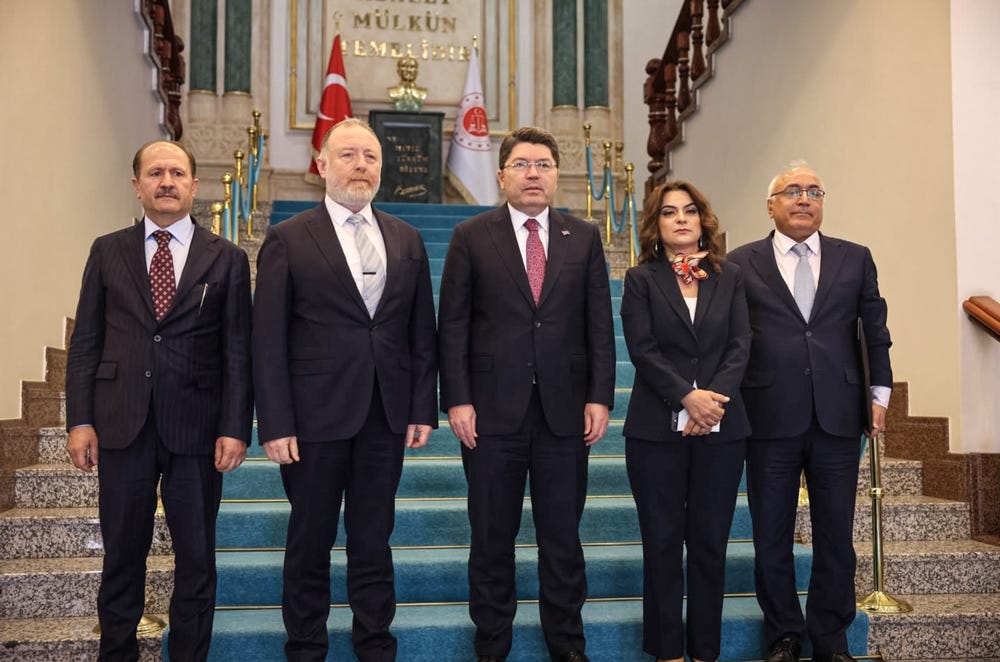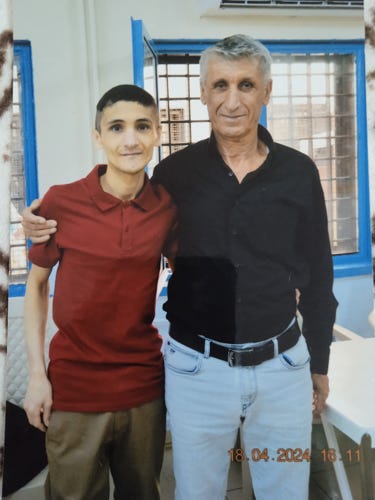ISTANBUL — On April 24, a DEM Party delegation held a meeting with Turkish Justice Min. Yılmaz Tunç. Together, they discussed the legal changes that might be applied in the ongoing peace process between the Turkish government and the Kurdistan Workers’ Party (PKK).
The gathering was prompted by jailed PKK leader Abdullah Öcalan, who two months earlier had called on the militant group to disarm and dissolve in exchange for Ankara’s “recognition of democratic politics and a legal framework”, among other concessions.
DEM Party officials have long called for improved prison conditions for not just Öcalan, but also for critically ill prisoners, of which there are currently 1,412 in Turkey, according to a recent report by the Human Rights Association (IHD).
In that context, one of Ankara’s first moves in the peace process might have been the release of Soydan Akay the night of May 12, hours after the PKK announced its dissolution and disbandment.
Akay was sentenced to jail in 1993 on charges of separatism and membership of the PKK. Diagnosed with prostate cancer, rheumatoid arthritis, hepatitis B, hypertension and heart disease, Akay was granted a conditional discharge in 2023, but a prison council had postponed his release four times due to “poor behavior”.
The Ministry of Justice did not respond to questions about the circumstances of Akay’s release.
With the peace process underway, rights advocates and DEM Party officials are now calling on Ankara to amend laws on critically ill prisoners, aiming to improve their prospects for release and better align the Turkish penal code with international norms.
Öztürk Türkdoğan, a DEM Party deputy co-chair and member of the delegation that met with Justice Min. Tunç, said decisions to keep critically ill prisoners in jail can deny them necessary medical treatments and, at times, have resulted in unjust deaths.
“[It is] a violation of the right to life,” Türkdoğan told Turkey recap. “You are actually condemning a person to death without issuing a death penalty, and we know that many prisoners have lost their lives this way.”
Terms and conditions
As of April 7, 2025, there were 403,060 detainees and convicts in 395 prisons in Turkey, according to the data from the General Directorate of Prisons and Detention Houses, which operates under the Ministry of Justice.
However, the bed capacity of prisons in Turkey is 299,881, meaning about 103,000 prisoners do not have regular access to a bed. The data also indicates the number of prisoners has increased 570 percent since the AKP came to power in 2002, when the total number of detainees was 59,429.
The Justice Ministry does not release data on sick prisoners, though IHD reports provide an approximated estimate based on data provided by the association’s branches, lawyers and affected families around the country.
Of the 1,412 sick prisoners recorded by IHD, 161 are women and 1,251 are men. Additionally, 335 are considered seriously ill, and 230 need daily medical assistance.
Yusuf Erdoğan, a lawyer and co-spokesperson for the IHD Central Prisons Commission, said the data does not reflect the full picture because many sick prisoners refuse medical treatment due to the security protocols required for transfers between prisons and hospitals.
This includes the double-cuffing of the wrists, oral searches, handcuffing during medical examination and, often, examination with the presence of security officials in the room.
“There are people who are sick but do not want to be subjected to this treatment,” Erdoğan told Turkey recap. “[There are] also people who get sick, have their initial examinations but do not continue or disrupt their treatment due to these conditions.”
“The data is just the tip of the iceberg,” he added. “This is what we could access. The reality is much more dire. Prisons are the places where the most severe basic human rights violations occur in this country."
Mehmet Emin Çam
One of the sick prisoners in the IHD report is 73-year-old Mehmet Emin Çam. He was initially arrested within the scope of the Kurdistan Communities Union (KCK) trials in 2013, when he was Siirt provincial co-chair for the pro-Kurdish Democratic Regions Party (DBP).
He was released and arrested again in a March 2022 raid on his home, where he was taken from his sickbed and imprisoned in Batman.
Çam, who was diagnosed with a brain tumor, had a heart attack on May 27, 2022, and underwent an angioplasty. He also has kidney disease, hearing loss in his right ear and difficulty walking due to paralysis on the left side of his body.
Multiple applications for Çam’s release have been rejected to date. Turkey’s Council of Forensic Medicine (ATK), which operates under the Justice Ministry and provides expert opinions on health and legal matters, issued a report on Nov. 15, 2024, stating that Çam "can sustain his life in prison."
On April 16, 2025, Çam had another heart attack. He was taken to Batman Training and Research Hospital, where he was treated while handcuffed. His lawyers have since reapplied for his release.
His daughter, Şimel Çam, last visited her father on May 7. She said he has difficulty walking and can only move with assistance from others.
"His doctors said there is a risk of another heart attack,” Şimel told Turkey recap. “My father doesn't say much, but this time he said, 'My pains are very bad.' Three of his brain vessels are blocked due to the tumor in his brain.”
Şimel added that her father felt great discomfort in going to the hospital, defining visits as “torture” and said he preferred to avoid further medical treatment.
Besra Erol
Another sick prisoner is Besra Erol, the 66-year-old mother of Evrim Deniz Erol, who lost his life in a 2015 Islamic State bombing in Suruç.
A lawsuit was filed against her for saying, "I know who the murderers are" at her son’s funeral. She was arrested, released after one year in prison and then arrested again in 2019 with a 7.5-year sentence on the charge of "being a member of a terrorist organization". She is currently in Elazığ Women's Closed Prison.
"I last saw my mother a month ago,” Aram Erol, Besra’s son, told Turkey recap. “She has had three lumbar hernia surgeries, two inguinal hernia surgeries, two eye angiographies and she urgently needs eye surgery now, but she refused to have the surgery.”
Notably, Besra has completed her prison sentence, but she has yet to be released. The local Prison Administration and Observation Board (İdare ve Gözlem Kurulu) postponed Erol's release for a year because she did not express remorse for her crime. She will reappear before the board the first week of July.
"Now, while this [peace] process continues, I expect and hope that my mother will be released before July. And other sick prisoners, too ... If we are brothers, the law should apply to us, too. Let this hostility end,” Aram Erol said, referencing the brotherhood narrative often used by Turkish Pres. Recep Tayyip Erdoğan’s when discussing the peace process between Turks and Kurds.
İsmail Tamboğa
A third well-known critically ill prisoner is İsmail Tamboğa, who was arrested in 2015 at age 16. Tamboğa was tried as an adult and received four aggravated life sentences on charges of "intentional manslaughter" for allegedly killing a police officer during curfews in Cizre.
Tamboğa has protein leakage in his kidneys. His condition has deteriorated his jawbone and caused all his teeth to fall out. Meanwhile, his lawyer, Mehtap Sert, said Tamboğa’s original sentence was overturned by the Court of Cassation and he is now awaiting a retrial.
Abdullah Tamboğa, İsmail’s father, said he last saw his son in a visit during Eid al-Fitr in March.
"My child also has a lung disease, he has been sick for years. It's been 10 years, let them release him now so he can get treatment," Abdullah told Turkey recap. "There's a process now. It's ongoing. Will they release our children?"
Article 25
Along with individual cases, rights advocates have pointed to both legal and physical shortcomings in Turkey’s prison system, such as the lack of direct ventilation and heating in some jail cells, which can worsen the conditions of sick prisoners.
“Can you imagine you are kept in a room, and you must go through the corridor to another place for ventilation. So, your room does not get clean air. This is already a source of many diseases and is also contrary to basic human rights,” said DEM Party’s Öztürk Türkdoğan, who was previously the chair of IHD.
For years, IHD has monitored rights conditions in Turkey, concluding domestic laws and detention practices do not comply with international regulations such as the Mandela Rules, also known as the United Nations Standard Minimum Rules for the Treatment of Prisoners.
Specifically, IHD has cited human rights issues with Article 25 of the Law No. 5275 on the Enforcement of Sentences and Security in Turkey. This article regulates the enforcement of aggravated life imprisonment and requires sentences not to be interrupted under any circumstances, preventing the release of sick prisoners.
Human Rights Watch also highlighted Article 25’s life-threatening implications during the Covid-19 pandemic, noting the European Court of Human Rights (ECHR) previously ruled that Turkey should create pathways to commute or terminate aggravated life sentences.
Along with changes to general prison conditions, Türkdoğan has said Article 25 needs to be amended.
“It is enough to just make legal changes,” Türkdoğan told Turkey recap. “There is no need for a constitutional amendment or anything. The constitution already guarantees the right to life.”
Türkdoğan said DEM Party officials suggested various legal reforms regarding the rights of sick prisoners with Justice Min. Tunç during their April 24 visit.
Following the meeting, Tunç discussed the details of the forthcoming judicial reform package at a May 16 press event. When asked about the possibility of an amnesty for prisoners, he responded:
“We are constantly making improvements in our legislation. For example, we say 'sick convicts should not die in prison'. This is against human rights. [But] it is not right to interpret this as a general amnesty. Amnesty is not on the agenda.”
Turkey recap is an independent, reader-supported newsletter that helps people make sense of the fast-paced Turkey news cycle. Contact us: info@turkeyrecap.com.
Subscribe here on Substack (or on Patreon for a student discount). Paid subscribers get full access to our recaps, reports, members-only chat and news tracking tools.
Turkey recap is produced by our staff’s non-profit association, KMD. We are an affiliate of the Global Forum for Media Development and aim to create balanced news that strengthens local media by supporting journalists in Turkey.
Diego Cupolo, Editor-in-chief
Emily Rice Johnson, Deputy editor
Günsu Durak, Turkey recap Türkçe editor
Ceren Bayar, Parliament correspondent






